My Old Flame
| Jazz Notes |
My Old Flame
“Belle of the Nineties” - western comedy starring Mae West. Ruby Carter (West) is a cabaret singer working in Mississippi. In a man's world, Ruby has little trouble surviving on her own terms, resisting the attentions of a deluge of lecherous men. Instead, she reserves her affections for a boxer called The Tiger Kid (Roger Pryor). The film was based on West's original story “It Ain't No Sin” which was also to be the film's title until censors objected. A publicity stunt went awry when 50 parrots were trained to shout the original title of "it ain't no sin". The film was released on September 21, 1934.
My Old Flame
Mae West, expertly accompanied by Duke Ellington’s Orchestra, introduced Arthur Johnston and Sam Coslow’s number “My Old Flame” in the motion picture. West had long been a fan of Duke Ellington, insisting that Ellington and his orchestra appear in the film. Although Paramount executives lamely balked that he was too expensive, West got her way. Duke and company expertly accompanied West on several numbers in the film.
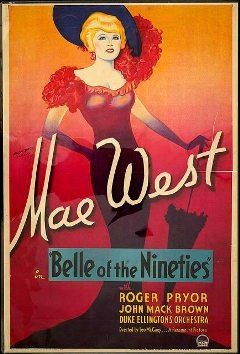
Belle of the Nineties (poster, 1934)
West was no great vocalist, but, as was the case with many ex-vaudevillians and Broadway stars, she knew how to “put a song over.” Variety magazine praised her performance, commenting that Ellington’s accompaniment was a “natural for Mae West.” One of West’s biographers, Maurice Leonard in his book Mae West: Empress of Sex, commented, “She sings the best she ever did on film.”
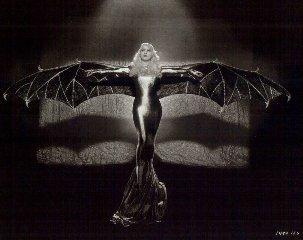
Mae West in Belle of the Nineties
The sheet music for "My Old Flame”credits both Coslow and Johnston for music and lyrics, however, various other references, including Robert Gottlieb and Robert Kimball in their book ‘Reading Lyrics’ suggest Johnston wrote the music and Coslow the words. Coslow himself in his autobiography ‘Cocktails for Two’ just says he and Johnston "collaborated" on the song. However, in his comment quoted on Duke Ellington congratulating him on writing "My Old Flame" there is an implication that Ellington is referring to the music, as he almost never wrote the lyrics for his own songs.
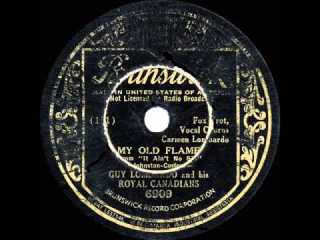
Guy Lombardo - My old flame (single, 1934)
Arthur Johnston was born in New York City and started out professionally playing piano for silent films. He would later become Irving Berlin’s pianist and musical director of stage production. Johnston moved to Hollywood in the late 20’s and initially found success arranging the score for Charlie Chaplin’s “City Lights.” He went on to contribute to dozens of film scores, often collaborating with Johnny Burke and Sam Coslow.
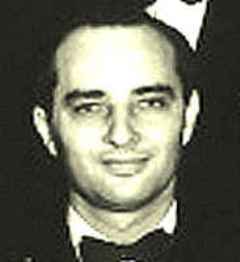
Arthur Johnston
Sam Coslow began writing songs as a teenager and had his first hit song in 1920. But his career didn’t really take off until he and his music publishing partner sold their business and moved to Hollywood in 1929. His most successful collaboration was with composer Arthur Johnston with whom he wrote a series of hit songs for films.
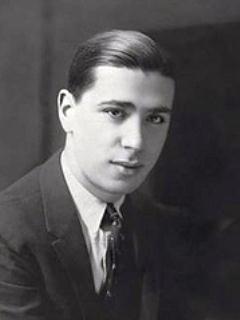
Sam Coslow
In his autobiography, Coslow gives some background on the Mae West performance of "My Old Flame" when he points out that having her do "a torch ballad" was something new for her. Coslow goes on: “Her rendition established what was to be a song standard. . . . [and] I don't suppose it hurt her one bit that she had the backing of Duke Ellington and his band in the scene. We had suggested Duke to Mae.”
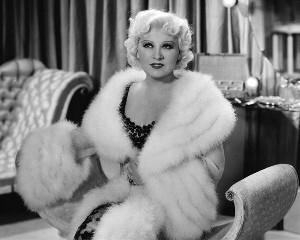
Mae West
Clarinetist Goodman and vocalist Lee are heard in one of the earliest and most successful of their many collaborative performances. Eddie Sauter’s lush arrangement provides an effective backdrop for Lee’s elegant vocals. Coslow states, "Peggy's rendition of My Old Flame" on the Goodman record is one of my prize possessions". According to Ivan Santiago-Mercado, Peggy Lee's discographer, the two takes were made on August 20, (Chicago) and October 2, (New York) 1941.
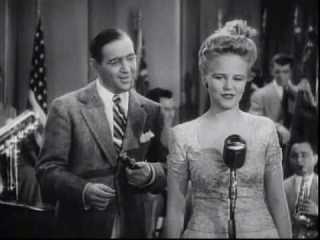
Benny Gooman & Peggy Lee
Saxophonist Charlie Parker offers one of his landmark ballad performances, finding a remarkable balance between reverence for the melody and creative improvisation. His young disciple Miles Davis is also featured on a lyrical trumpet solo. Ted Gioia says the recording Parker et. al. made for the Dial label November 4, 1947, "ranks with the most moving ballad performances of his career."
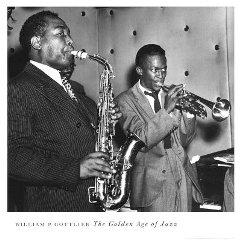
Charlie Parker & Miles Davis
For Ted Gioia (in ‘The Jazz Standards: A Guide to the Repertoire’), “My Old Flame” is especially interesting because it is written in a major key but sounds minor, and because it combines two contrary modes: intimacy and intricacy, a combination that "casts a certain charm over performances of the standard." He notes that the song has retained and even increased its popularity with jazz musicians having received more recordings in the first decade of the twenty-first century than in the thirties and forties combined.
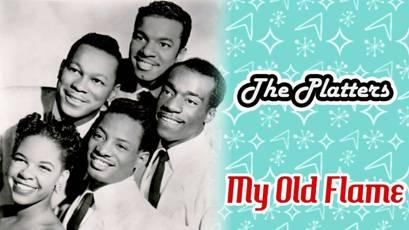
The Platters - My old flame (1958)
The tune never really caught on in a big way with the public and never hit the charts. But a 1947 recording by musical funster Spike Jones and his City Slickers was certainly popular, and, like many of his recordings, sold well and continues to be available in reissue packages.
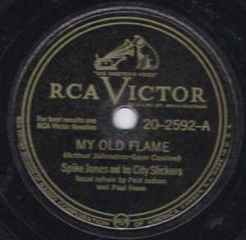
Spike Jones - My old flame (single, 1947)
"My Old Flame" [From 'Belle of the Nineties'] Lyrics
My old flame, I can't even think of her name, but it's funny now and then How my thoughts go flashing back again to my old flame My old flame, my new lovers all seem so tame, for I haven't met a girl So magnificent or elegant as my old flame I've met so many who had fascinating ways A fascinating gaze in their eyes, some who took me up to the skies But their attempts at love were only imitations of my old flame I can't even think of her name, but I'll never be the same Until I discover what became of my old flame I've met so many who had fascinating ways A fascinating gaze in their eyes, some who took me up to the skies But their attempts at love were only imitations of my old flame I can't even think of her name but I'll never be the same Until I discover what became of my old flame
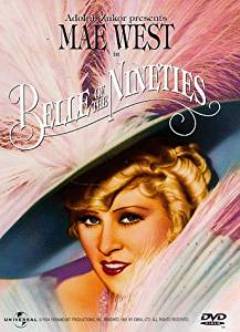
“Belle of the Nineties”
